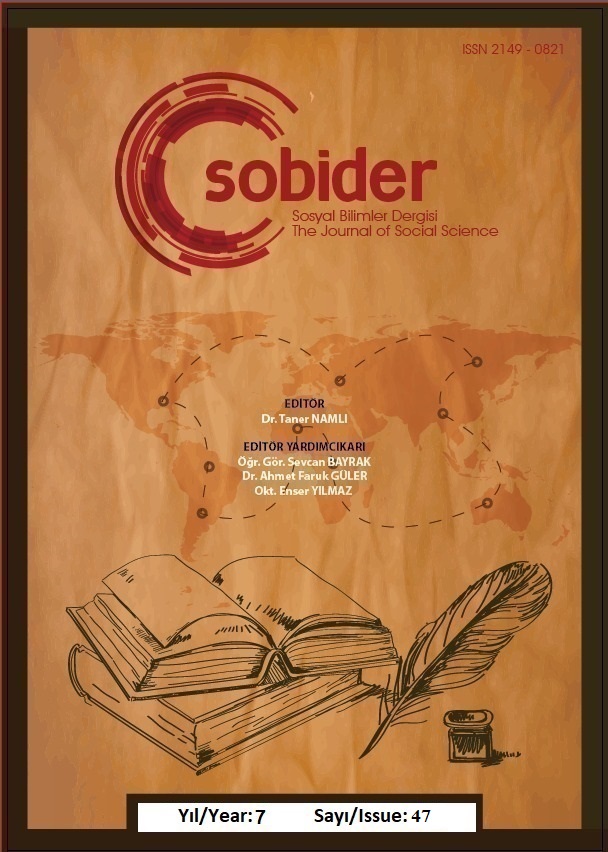Author :
Abstract
Siyasi gözlemci Francis Fukuyama, The National Interest’te yayımladığı Tarihin Sonu mu? başlıklı makalesinde Soğuk Savaş’tan sonra Sovyetler Birliği’nde meydana gelen olayların sadece sosyalizmin çöküşünü imlemekle kalmadığını, aynı zamanda insanlığın siyasi ve sosyal evriminin bitişini, tarihin sonunu işaret ettiğini ortaya atar. Bu savı destekler nitelikte toplumsal sistemin uygulanabilir en son alternatifi olan liberalizmin, öncellerinin ya da çağdaş alternatiflerinin ötesine geçtiğine ve toplumsal sistemlere yönelik iyiyi bulma arzusunun kompleks tüketim isteklerine doğru yön değiştirdiğine vurgu yapar. Toplumsal sistemlerin ortaya çıkışını yalnızca insanların maddi ihtiyaçlarını karşılamaya bağlayan Marksist bakış açısının karşısına Alexandre Kojéve’den alıntıladığı şekliyle Hegel’i koyar. Bu yönüyle insanların toplum içinde bir meta olmaklıktan öte, toplumda kabul görme arzusuyla kendini modern dünyada yeniden konumlandırdığını iddia eder. Bu savlar doğrultusunda yazıda tarihsel ilerleme kuramına dönüşmüş olan Tarihin Sonu tezini, modern dünyanın içinde bulunduğu şartlar doğrultusunda, eleştirel bir şekilde açıklamak amaçlanmaktadır.
Keywords
Abstract
In his article entitled “The End of History?” published in The National Interest, political observer Francis Fukuyama propounds that the events that took place in the Soviet Union after the Cold War not only marked the collapse of socialism but also marked the end of the political and social evolution of humanity and the end of history. He emphasizes that liberalism, the latest viable alternative to the social system, which supports this argument, goes beyond its predecessors or modern alternatives, and the desire to find the good for social systems changes direction towards complex consumption demands. He puts Hegel, as he quotes from Alexandre Kojéve, against the Marxist perspective, which associates the emergence of social systems only with meeting the material needs of people. In this respect, he claims that people are repositioning themselves in the modern world with the desire to be accepted in society, rather than being a commodity in society. In line with these arguments, he aims to critically explain the End of History thesis, which has turned into a theory of historical progress in the article, in line with the conditions of the modern world.
Keywords
- Benedict, A. (2011) Hayali Cemaatler: Milliyetçiliğin Kökenleri ve Yayılması, (Çev. İskender Savaşır), Metis Yayınları, İstanbul.
- Berktay, F. (2008) “Liberalizm - Tek Bir Pozisyona İndirgenmesi Olanaksız Bir İdeoloji”, 19. Yüzyıldan 20. Yüzyıla Modern Siyasal İdeolojiler, (Ed. H. Birsen Örs), İstanbul Bilgi Üniversitesi Yayınları, İstanbul.
- Bertram, C. Chitty, A. (2006), Tarihin Sonu Mu: Fukuyama, Marx, Modernite, (Çev. Kamil Kurtul), İmge Kiabevi, İstanbul.
- Brennan, T. (2010) “Bir Karşı Gelenek Oluşturmak”, Barbarları Beklerken, (Yay. Haz. Müge Gürsoy Sökmen, Başak Ertür), Metis Yayınları, İstanbul.
- Critchley, S. (2009) Ethics –Politics- Subjectivity: Essays on Derrida, Levinas, & Contemporary French Thought, Verso, London and New York.
- Derrida, J. (1999) “İnsan Bilimlerinin Söyleminde Yapı, Gösterge ve Oyun”, (Çev. Özkan Gözel), Toplumbilim: Jacques Derrida Özel Sayısı, Sayı:10, Bağlam Yayınları, Ankara, (167-176).
- Derrida, J. (2004) Marx ve Mahdumları, (Çev. Alp Tümertekin), Ayrıntı Yayınları, İstanbul.
- Derrida, J. (2007) Marx’ın Hayaletleri: Borç Durumu, Yas Çalışması ve Yeni Enternasyonal, (Çev. Alp Tümertekin), Ayrıntı Yayınları, İstanbul.
- Derrida, J. (2010) Gramatoloji, (Çev. İsmet Birkan), BilgeSu Yayınları, Ankara.
- Erdoğan, M. (2009) “Liberal Olmak Ne Demek?”, Liberalizm, Demokrasi ve Türkiye Modeli, Plato Film Yayınları, İstanbul.
- Fukuyama, F. (1989) “The End of History?” National Interest, Summer.
- Fukuyama, F. (2005) Güven [Sosyal Erdemler ve Refahın Yaratılması], (Çev. Ahmet Buğdaycı), Türkiye İş Bankası Kültür Yayınları, İstanbul.
- Fukuyama, F. (2012) Tarihin Sonu ve Son İnsan, (Çev. Zülfü Dicleli), Profil Yayınları, İstanbul.
- Hardt, M. Negri, A. (2008) İmparatorluk, (Çev. Abdullah Yılmaz), Ayrıntı Yayınları, İstanbul.
- Hegel, G. W. F. (1953) Reason in History: A General Introduction to the Philosophy of History, (Trans. by Robert S. Hartman), New York: The Library of Liberal Arts.
- Odabaş, U. K. (2018) “Liberalizmin İlk Temsilcisi: John Locke”, Güzel Sanatlar Fakültesi Sanat Dergisi, Erzurum, ss. 73-80
- Sim, S. (2000) Derrida ve Tarihin Sonu, (Çev. Kaan H. Ökten), Everest Yayınları, İstanbul.
- Sloterdijk, P. (2012) Derrida, Bir Mısırlı, (Çev. Tuğçe Ayteş), MonoKL Yayınları, İstanbul.
- Watson, S. (1987) “Regulations: Kant and Derrida at the End of Metaphysics”, Deconstruction and Philosophy: The Texts of Jacques Derrida, (Ed. John Sallis), The University of Chicago Press, Chicago and London, (ss. 71-86).





